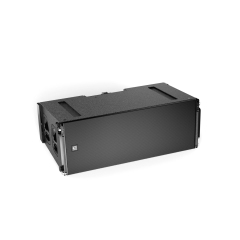Stage monitor speakers provide that essential feedback necessary for performers to hear themselves as well as other band members in order to keep the songs tight during a performance. Given the often considerable distance to larger arenas' main speakers, without delay-line capabilities on stage-monitors musicians and performers would fall out of sync fast. Even if this delay is quite short but often just a few milliseconds, it creates substantial timing offset which ultimately translates into your sound as an asynchronous melody.
The effectiveness of stage monitor speakers work has a lot to do with their power and design. A typical high-quality stage monitor is powered by 100 to 500 watts RMS, enough juice to ensure distortion-free sound reproduction no matter how loud you turn up the volume. Most monitors have a frequency response that can cover the deep bass to high treble ranges of 50 Hz-20kHz, enabling musicians and performers alike to provide every intricate detail in their music.
In a professional context, wedges are almost exclusively used; they point upward to the singer standing directly over them. With this design, sound spill to your audience is greatly reduced thereby controlling the stage sound. For instance, large rock bands like U2 and The Rolling Stones still use giant wedge monitors when they play to tens of thousands (or more) screaming fans in a stadium.
Further protecting the hearing of talent are stage monitors. By lowering the general sound level and providing a performer with controlled desired mix of combined or isolated instruments, as well as vocals directly to each artist (innotypically using one's In Ear Monitors) Stage monitors reduce feedback risks,the need for anexcessive volume onstage causing challenges hearing oneself sing over loud drum noise,tempo being rushed due to speed up effect caused by too much stage volume, which can lead result in turning all instrument amplifiers offstage. The Hearing Health Foundation says ongoing exposure to anything more than 85 decibels can be hazardous. To counteract this risk, stage monitors help performers hear themselves at lower volumes which are significantly less harmful in the long run.

The option for tailoring the mix is yet another huge benefit of stage monitor speakers. With the infinite possibilities for a mix of instruments and vocals, each performer can get their very own private show; customized to hear only what they need to perform best. It is crucial for complex performances, where there are a number of different instruments and vocals that concern perfection balances between them. For the very best in individual personalisation, those using stage monitors often also sport in-ear monitors that provide even more fine-tuned control over what each performer hears.
Anyone who works in the industry will tell you how vital stage monitors are for live performances. As the famous audio engineer Bob McCarthy, of Cirque du Soleil fame once said—“stage monitors are virtually life support for performers. This is something without which no musician, even the supreme ones can hope to pull a perfect performance. This one goes to show how fragile performers are in terms of what they actually hear and the quality delivered by stage monitors.
A stage monitor speaker is also essential to make sure vocalists are in tune. Live environments mean main PA is loud, and the only thing that you can do to help singers clearly hear themselves. Because the speakers are designed specifically for the human voice and not tied to a mixer, they provide extremely clear vocals while allowing singers who want or need it to monitor their pitch in real time. This is particularly important for genres like classical opera or musical theatre where accurate pitching matters.
Stage monitor speakers are very well worth the investment for solo artists or bands. Just an excerpt: In either case, monitors enable performers to clearly hear themselves and each other — plain English translations of what those terms are supposed to mean!